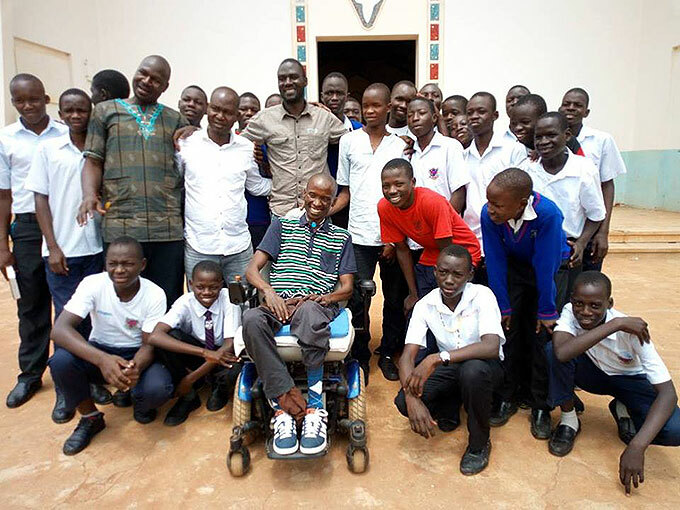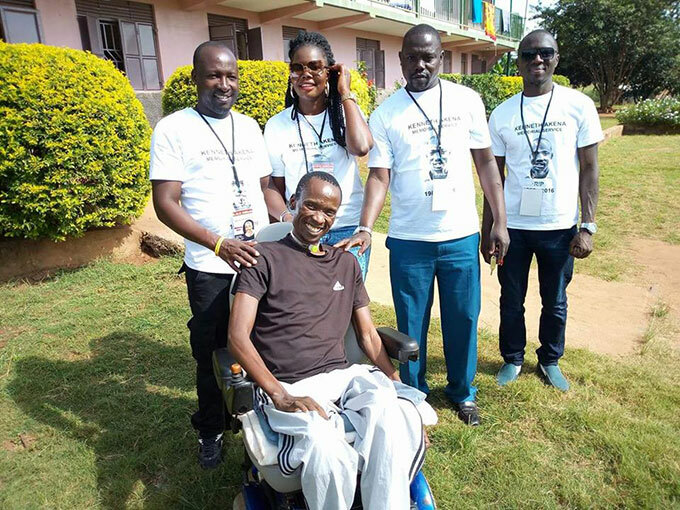2010 bomb attacks brought my life to a halt - Ojara
Jul 13, 2018
The reality of living in the wheel chair for the rest of his life is daunting.

Once, Benjamin Ojara wanted to suffocate himself to death.
"I thought I should commit suicide and put an end to my daily struggle once and for all," Ojara says, adding "But it was difficult…it would be very painful, so I gave up the idea."
The reality of living in the wheel chair for the rest of his life is daunting.
"I wake up afraid, confused and in panic," he says.
Ojara is one of the victims of the July 11, 2010 twin bombs attacks at Kyadondo Rugby grounds and the Ethiopian Village restaurant in Kampala that killed 76 people. Revelers were watching the World Cup final between Spain and Holland. The Al-Shabaab terror group claimed responsibility, following Uganda's peacekeeping mission in Somalia.
Ojara was critically injured and is still nursing wounds - eight years later. He intimates that that his cannot feel his legs and the lower part of his body. He has a tube inside his chest to aid his breathing. He cannot hold urine.

Ojara visited by wellwishers
An ambitious young man, who was just in second year of his telecom-engineering degree program at Kyambogo University, Ojara's dreams suddenly ground to a halt.
What he recalls
Ojara was one of the fans that were watching the live match on giant screens at Kyadondo Rugby grounds.
On a normal Sunday, he loved to stay at his tenement in Banda after a hectic week - having been juggling school and a part time work as a technician at a private firm.
For some reason that day, he decided to go and hang out Kyadondo. Ojara found himself a seat on the first row where he could watch the match uninterrupted.
"Some people were drinking excessively and smoking at the same time. Because of the stench from the smoke. By second half, my instinct was telling me to go away, but another part of me decided to stay until the end," he reminisces.
He never did.
At about 80 minutes into the World Cup game, Ojara felt something strange hit him on his neck and immediately after, he heard a deafening blast.
"it was a very, very loud explosion. I found myself sitting on my torso, on a different chair. I was paralysed and I could even see blood jetting from my neck," he says, adding later that he saw pictures of himself in a blood stained white shirt on the internet.
A bomb fragment, he would later discover, was as small as the tiny round ball at the tip of a pen, hit him on the right side of his neck and exited from the left. It hit him at the C7 section of the spinal cord, a devastating blow that adversely affected his respiratory functions and would later cripple him - to date.
He could faintly see other people scattered all over the place, lifeless. There were screams, then a second explosion went off. More screams filled the air. Ojara wanted to get up and run but he realized he was already paralyzed. He heard someone mentioning that the terrorists had attacked Uganda. "But I was stuck in one place," Ojara says.
"A stranger came by I told him to get my phone from pocket and call my workmate Daniel Owili. In that moment, security forces chased everyone off the scene. The stranger went with my phone," he narrates.

Ojara with friends
Ojara was shoved into a Police double-cabin, together with the bodies of other bomb victims and driven to the mortuary at Mulago Hospital.
"They thought I was dead because at that moment I could not even move my hands," he says.
As luck would have it, someone at the morgue noticed that Ojara was still breathing and transferred him to the Out-patient department.
"There, doctors thought I was just traumatized, because they did not see the hole on my neck. It took very close examining by one doctor to spot it," he says.
About a day later, Ojara was transferred to Spinal Ward , where, his family was contacted. "Although my phone was gone, I thankfully knew my dad's phone off curf," he says. His dad, John Wilfred Opiya - then a teacher at Okol Primary School in Mucwini sub-county in Kitgum, was already hysterical.
"He told the nurses that my friends had been searching for me in vain . After the call, the ward was nearly full of my friends within two hours.
After several months of admission and a series of scans and tests done at Mulago, Kololo and IHK hospitals, Ojara's bills were accumulating. His family also had growing personal problems to care of back home. He knew had to return home in Kitgum and wait for his fate. By April 2011, made up his mind and left the hospital against the advice of medical staff.
Touched by his plight, a good Samaritan Loyce Ford, offered him shelter at her orphanage Tender Trust home, in Lemo Bongo-Lewic, a Kitgum town suburb.
"This is where I am given the best care today. And children are my greatest company," he says, affording a chuckle.
Appeal
Ojara is incapacitated and cannot do anything on his own. He cannot sit, stand, walk or answer calls of nature without help from caregivers at the orphanage. His lower part of his body is still paralysed. He a special tube (tracheostomy) fixed in his throat to breathe.
He depends on good Samaritans to keep going. " People who don't know me I was touched by my story. Dr. (Victoria) Nekesa came to visit me personally after hearing about my plight and gave me some money," he says.
Still, he says, it is not enough to pay the bills and pleads with government to compensate him with a monetary reward to keep him going.
"I need to hire permanent personal assistant since I am not even able to do basic things such as changing my urine bag. I need diapers. I need food to eat," he says.
At the time of this interview Ojara was fundraising on social media for an all-terrain wheelchair.
"If there is one thing disability has taught me, it is to be patient," he concludes.
